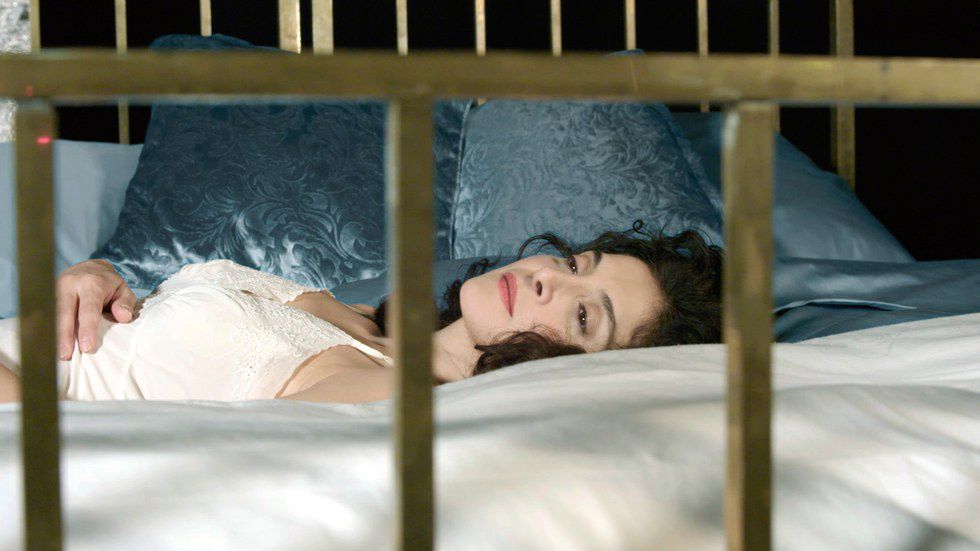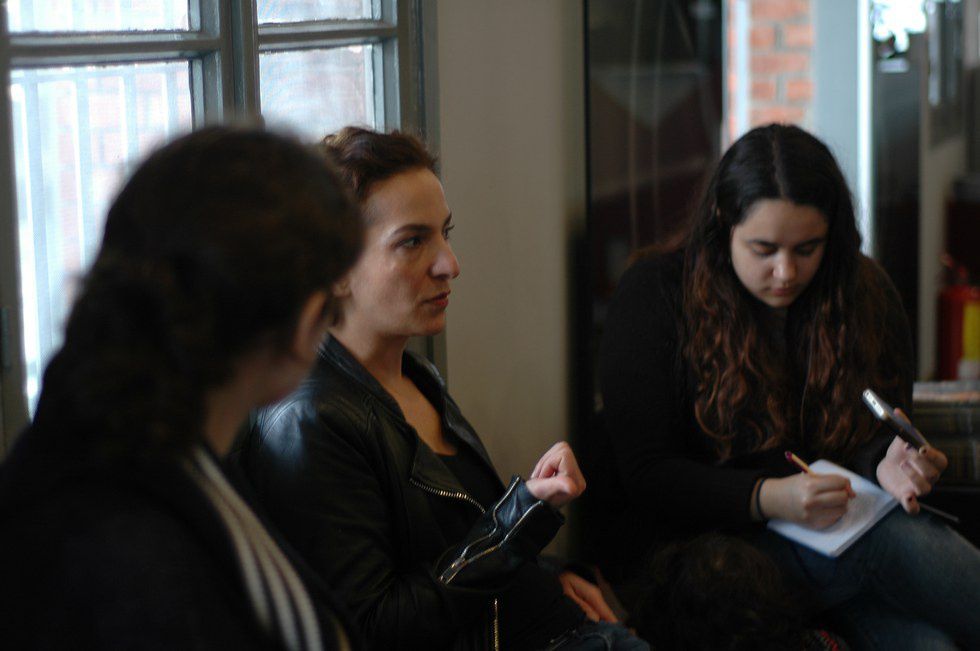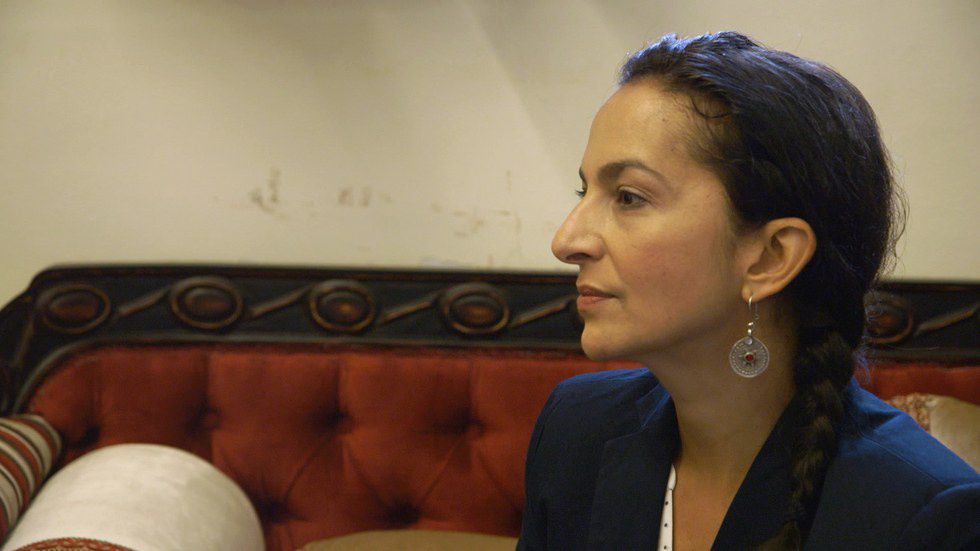Did you know that you can buy an artificial hymen that will bleed upon penetration for 50 euros?
The German film “The Virgin Obsession” by Güner Yasemin Balci started by showing this artificial hymen being dissolved with water onto a white sheet. This "blood" is supposed to resemble the purity of a woman and is a societal construct that infiltrates many, if not all, communities. In particular, Islamic communities.
Often, a red ribbon is put over the wedding gown to represent the woman's virginity, especially in Turkish marriages. If a woman doesn't bleed when having sex on her wedding day, she can be beaten and abandoned by her new husband. Yet, some women don't actually bleed the first time they have intercourse.
"The Virgin Obsession" is about the demonization of female sexuality, especially in Islamic communities. The film highlights suppression of women, excessively macho attitudes, violence against women, forced marriages, and abuse in the name of honor. Balci shows viewers that women shouldn't be viewed as a threat to communities because of their sexuality. Through interviews and showing the lives of young women who escaped their communities, viewers see how these women are told that if they aren't a virgin until marriage they will be thrown away and cause dishonor. I was so moved by the film that I interviewed the director when I was at the International Thessaloniki Documentary Film Festival. The film was also shown on TV in Germany. The director's thoughts on religion, sexuality, and freedom are stated below from our interview:
How long did it take you to make your film?
The funding took 5 years to get and we started filming in 2014. We finished in 2015.
When your film was shown in Germany, what were the reactions from viewers?
Most of the reactions were very positive and a lot of people watched the film but of course, there were also very negative reactions. I knew that there would be because there often is with my work. I call the critics much more fundamental Islamists that are against all kind of critic. Most of the people liked it and also many Muslim people liked it.
Why was making this film important to you?
I grew up in a neighborhood where, in the 80s, the first refugees from Palestine moved in. Overtime, life changed because they had very different moral standards, influenced by their culture and, of course, religion. We got to feel it. A lot of things changed for the girls. Suddenly, it was not normal to have boyfriends and to wear short skirts because you were pointed out as someone who was not honorable enough and it became a problem for your whole family. People would go to the family and say “she is too free and is going out with boys which isn't good.” My parents were much more free, so I grew up differently, but I felt the change too. Over the years it became normal to live in this Islamic way where boys and girls are separated when they go outside. The neighborhood became a Muslim neighborhood and people that wanted to live differently had to leave. I always thought about why this happened and what the reason for this segregation of men and women was. Why is it so important in the Muslim religion? They influenced the Germans that stayed in my neighborhood because it was either you became a victim because you didn't fit in the moral standard or you converted. Some of the Germans I grew up with became very radical Muslims because they were influenced growing up.
Do you think that religion is the most powerful influence in communities?
When religion is out of control, when we have this political Islam that we have all over the world, then sooner or later you will have problems because the rules and the idea of living together as a community is so different from what we call a democratic or free society. It's the opposite model. It's an unfree society and if you put belief on top of everything, it becomes a big problem. If religion is something emotional and personal, how belief should be, then, in my opinion, it is not dangerous.
Can you give an example?
Yes. When you grow up in a society where the rules of Allah are the most important rules, then when the community sees that someone doesn't live by these rules, they will point them out and stress that the person must change or leave. It will not be possible for you to live as an individual in that kind of community. If you start to think "maybe there is no God" and you talk about it with parents or friends, you will get into trouble. They will not accept your thinking. People who make these standards and are responsible for political Islam will not lose their power and anyone who criticizes and breaks out is a danger to them. But because these people are scared they will be punished by God or their community they refrain from doing this, even if their views differ. If God is viewed as frightening and always punishing, then people will be stuck into this world of belief where they really think they will be punished when they don't follow the rest. It's not just Islam that is like this. You can find it in other orthodox religions.
What do you mean by political Islam?
When I talk about political Islam I talk about controlling the day life. For example, when you have preachers, or Imans, they often tell the people they should not have too much contact with nonreligious people or Germans (in my community). They start to influence the day life and it even becomes an issue in schools. When I was a child it was normal to go to a very mixed cultural and religious school. It was never a problem. Since more mosques were built, people were taught not to come into contact with other cultures because it would be bad for their Muslim identity. They'd say that sooner or later those that do would break the rules and their children might have partners that aren't Muslim. So now we have a situation where schools like my primary school have over 90 percent of children coming from Muslim families, which doesn't mean they aren't good students or it's not a good school, but the thing is that the rules of the minority took over. Girls and boys are not allowed to play sports together, although they are just kids. There are many more little girls wearing head scarves and they are not allowed to go swimming, but the boys are. Some aren't allowed to ride bicycles! There are people that are radicals and then there are people forced to conform by their neighborhood and neighbors. I know Muslim fathers that would want to send their daughters to parties, but would do it in a way where no one would see because they live in this neighborhood and don't want to be told “you are not a honorable man because you let your daughter go out in the evening, how can you do this?”
* Here she breaks to mention the New Year's Eve sexual attacks in Cologne, Germany where hundreds of men sexually attacked women. She briefly mentions how this was a turning point in Germany for discussing migration, Islam, and how it influences our lives since many suspects and perpetrators were Arabs or North Africans seeking asylum.
Who are your critics? Do they threaten you? Where are they from?
The first ones were Kurdish people because we made a film about a religious leader in Berlin. Later, I was threatened by religious leaders and people from Egypt, Palestine, and Turkey that live in Germany.
What is the message of your film?
I always try to give young people from this culture the chance to see alternatives and maybe have their own fight for their rights. It's important for them to know that it is possible not to just break away from the community and family, but also to fight for their individual rights bit by bit without having the fear that they will lose their whole culture or religion. You need to take the right to live your religion as you'd like to live your religion and must know that there are people thinking the same way.
Do you think those in the United States have total control over their bodies or do you think there exists a kind of virginity obsession with "slut-shaming"?
Well, what I've read about the extremist Protestant cultures and culture in America is very similar to what I know about the Orthodox Muslims in certain ways. I really believe when religion becomes an obsession, most of the time, the women and girls are the ones getting in the biggest trouble. It's not really something special for Islam.
But, what I saw in America is something I really hope we don't get in Germany. Homeschooling. This is very dangerous because school for most of the people who live in problematic families, however you define that, is the only island they can find to get in touch with other people or get the chance to see a different way of life and maybe one day to choose their own way of life. Otherwise, they are stuck into solely their family's way of life. But when you are not allowed to get in touch with other children in school and are always around family - it is prison. The right of a person to become an individual gets taken away. They can't develop a free mind and don't have the chance to see outside of their small world. I saw this in America and it scared me. When people think about American in Germany they say “ah, such free land and everything is possible.” No, it's a big land, where a lot is possible, but there are little islands everywhere.
Freedom of religion can be too free. We went to a mosque in America and the Americans are so proud that they have this freedom of religion, but a man at the mosque told us he believes in Sharia Rights and believes it is right that in Saudi Arabia people are killed when they are homosexual or when a woman is with another man. And I thought, how can you allow people to be preaching this? On the other hand, you want to have a free and open society, but in the end, you are allowing the biggest enemies of this free society to be powerful. But this is hard to control. How can you put a barrier?
What's the solution?
Education. Education that starts from kindergarten. It has to be more than mathematics or literature. We need to teach people their individual rights early on. Teachers will say that it is the parents' responsibility. But, this is something the government should do. The aim to give the children all the things they need to develop a free mind. Also, we need even more equal education. For me, equal education is not going to a school where you only see Muslims. When you live in a mixed society, then you should be able to see all parts of it. You see this in America with poor neighborhoods and schools not being mixed. We need to teach everyone equality and human rights.
What do you see as your next step and also for the movement shown in the film?
We founded an organization called the Muslim Forum Germany and we are trying to search for liberal Muslim leaders. We want to influence education and politics. Our long term goal is to found a mosque where women and men can pray together.
We laugh. Maybe one day. “I hope so” are the words we end our interview with.
If you're curious, here is the first website that comes up when you google artificial hymen: http://www.hymenshop.com/ ...pretty scary, right?
Here is a link to images of a group called Femen protesting topless at a town hall during Islamic Week in Berlin. They were dragged out on the floor for their protest against religious oppression and Sharia law. This protest was shown in the film. http://www.dailymail.co.uk/news/article-2586403/Tr...




















